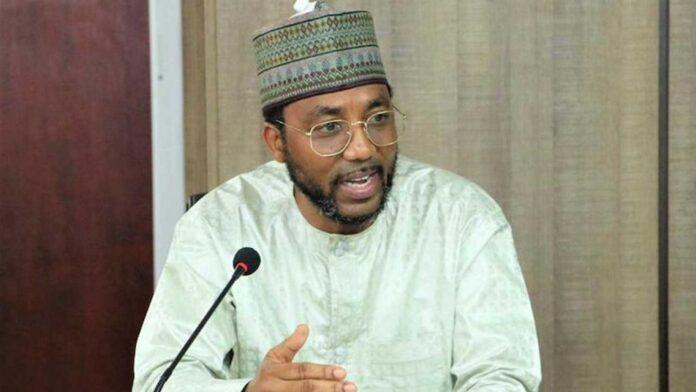The Managing Director and Chief Executive Officer of the Nigerian Ports Authority, Mohammed Bello-Koko, has reviewed the state of affairs in ports administration since he stepped in the saddle and concluded that improved port efficiency aided competitiveness in the sector.
The Managing Director of the Nigerian Port Authority made this known during an interview he granted on Wednesday,
Bello-Koko said during the interview that immediately he assumed office at the NPA, his primary focus was to improve efficiency of operations and services, adding that he believed once that was achieved “we would become more competitive”.
According to him: “To do that, we either introduce automation or ensure that the necessary marine equipment and other tools necessary for offering and providing services are provided and we have done that.”
He said the management on his watch set a higher revenue target for the year 2022 and achieved it.
He said: “I also said that we would ensure that we increased our revenue.
“We increased our revenue from about N317 billion to over N360 billion in 2022.
“Besides, we transferred about N80 billion to the Consolidated Revenue Fund in 2020 and over N91 billion in 2022.”
The NPA boss said that the authority was sharply focused on prosecuting its long-term projects, disclosing: “We have gone very far.”
He disclosed that funding remained the major drawback.
According to him: “We are looking for funding and necessary government approvals to ensure that we start rehabilitating all the ports, which include Tin Can Island, Apapa and the broken down and collapsed Escravos Break Water.
“There are also jetties and berths at Port Harcourt Port, Onne and Warri and Calabar. So, these are the plans we have put in place. For each of them, we have done quite well.”
On the Lekki Deep Seaport being the likely game changer in transportation of cargoes, Bello-Koko asserted that it would greatly impact on the process, even as he pointed out that the Lekki Deep Seaport was the first deep seaport in Nigeria with a draft of about 16.5 metres.
He said: “It has been inaugurated by the President, and that was a very, very good thing for us and for the government itself.
“This is the first government that I can say started the construction of a port, finished, and inaugurated it before leaving office.
“It was this administration that came in and gave all the necessary support through the Ministry of Transportation and the Nigeria Ports Authority.
“They have done the test run on all the necessary equipment; they have done their recruitments; people have been training, and the vessels have started coming in.
“At least, we had a vessel that came in to take out empty containers, and, in April, we expect that the first commercial vessel will come.
“So, business has started actually in Lekki Deep Sea Port. Everything is ready and it is going to be automated as we said and all the gaps we observed either in Tin Can Island Port or Apapa, whether in terms of scanners, equipment and others, you will find all of them taken care of in Lekki.”
He said that the Lekki Port would save time and cost of cargo transportation, which he said everybody was looking at whether as an importer or, as a shipping company.
Bello-Koko said that the NPA was already working on trans-shipment of cargoes to enable bigger vessels to berth or bring cargoes into Nigeria, instead of going to neighbouring Lome from where they use smaller vessels to bring cargoes into Nigeria.
He said: “But that is what Lekki Deep Seaport wants to start doing, and they already have a market for it; it is just to have the necessary cooperation by relevant government agencies to ensure that happens.
“That brings in more revenues to Nigerian Port Authority, and more activities into Nigeria also. So, it changes that perspective.
“We are no more going to have situations where cargoes cannot come into Nigeria because of lack of port infrastructure.
“Besides, the interconnectivity from Lekki to other locations is going on.
“There is a survey for a train to be linked there.
“So, it changes everything.
“It also creates competition; it means that the existing terminal operators need to sit up so as not to lose business to Lekki.”
The NPA boss expressed confidence in the authority’s concerted effort to improve on revenues through getting trans-shipment cargoes that Nigeria had never had.
According to Bello-Koko: “So, let us assume that we are losing 30 per cent of cargoes meant for Nigeria to neighbouring countries and by the time we improve our services and efficiencies to get in the trans-shipment cargoes which we have never had in Nigeria, through Lekki deep sea port, that will be another source of revenue which is also huge; and, now, by the time you also have improved scanning and inspection system by the Nigerian customs, that will also bring in more revenues.
“We are automating our system currently and we already have the revenues mechanism, which we are using to generate revenues to raise bills and so on and so forth, but we have been working with the International Maritime Organisation to deploy what we call a Port Community System.
“The Port Community System is a platform whereby all the stakeholders will come in to share information and documentation and automate their activities whether it is for importers or exporters and by the time we do that, it reduces the number of days it takes or hours for you to clear your goods.
“It means that you will be able to clear goods faster and you will be able to bring back your cargoes into the country while also generating revenues.
“So, we are working with IMO to ensure that we do that.
“There are also new business lines – we are giving licences to so many jetties to ensure that cargo is moved from the ports to other locations through the inland waterways and even the barge operation also is another new business for us.
“So, we see prospects; there are opportunities; it is just to tap into them and provide the enabling environment for them to thrive.”
Responding to a question on NPA’s stakes in the Lekki Port, Bello-Koko said the initial idea was for the NPA to have about 20 to 25 per cent stake, “but we felt there was need for us to reduce government’s involvement in private ports and reduce our equity to about 5 per cent.
“However, irrespective of the equity that NPA owns in that port, we still remain the regulator.
“We are the port regulator; we regulate the port activities and there will be revenue coming from there; and, of course, we know the issue of the land: there is contention as to who owns the land from a certain distance between the ocean and the land.
“It is owned by the government or NPA, but that was sorted out between Lagos State and the Lekki Deep Sea Port.
“So, that equity that we gave actually introduced statutory cover to the fact that you cannot have a private port in Nigeria and government does not have equity in it.
“That is the essence of that equity.”
Speaking on the extent of NPA’s regulatory controls on deep seaports, like the one by Pinnacle Oil, which is about 11 kilometres into the sea, Bello-Koko said: “We do and they call it an SPS.
“It is a Single Port Model that is mostly used for liquid cargoes, whereby the vessels do not need to come on shore to either load or offload.
“We give approvals for locations of those things; we also do coordinate; we also know when their vessels are coming in; we need to regulate their in and out (movements); they are also using our channels.
“So whether you have an SPM, it is the NPA’s channels that those vessels would come through and the regulatory functions are as they relate to their marine activities, but as for the evacuation and loading, that is between them and Nigeria National Petroleum Company (NNPC) Limited and whoever the importers are.”


























